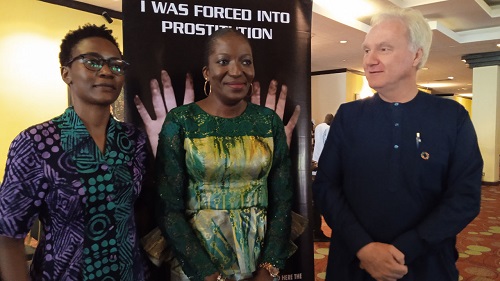This post has already been read 507 times!
As the world marks the 2022 World Day Against Trafficking in Persons, (WDATIP), the United Nations, (UN), Secretary-General Antonio Guterres has described technology as a veritable tool in countering the menace of Trafficking in Persons, (TIP).
The UN Chief made this known at an event marking the day organized by the National Agency for the Prohibition of Trafficking in Persons, (NAPTIP), in Abuja yesterday.
He said the prevalence of the crime is such that stakeholders must adopt multi-pronged approaches in addressing it for the protection of the rights of victims.
According to him, “human trafficking is a horrific crime and an all-out assault on people’s rights, safety and dignity. It is estimated that 2.4 million people across the globe are victims of trafficking and most of them sadly, are women and children migrants, refugees and internally displaced people.
“In Nigeria, the government, the UN and other partners are combining forces to amplify efforts across the country to curb trafficking, prosecute traffickers and protect the victims because, with the onset of the COVID-19 pandemic, the trafficking process has evolved to online recruitments.”
Represented by the UN resident coordinator in Nigeria, Mathias Schmale, Guterres commended the NAPTIP for recent achievements in combating the menace, stressing the need for sustained efforts in order to win the war against human trafficking.
Also speaking, Vice president Yemi Osinbajo, said that the federal government has provided direction, and support to NAPTIP and has shown the political will to make Nigeria a trafficking-free country through three key policy documents; the National Action Plan on Human Trafficking, 2022-2026, the National Policy for Protection and Assistance to Victims of Trafficking in Persons and finally the Protocol for Identification, Safe Return and Reintegration of Trafficked Persons.
Represented by the deputy chief of staff to President Muhammadu Buhari, Adeola Rahim, the vice present urged that the essence of the world day against trafficking in persons must never be lost. “We are here in solidarity with victims and survivors of human trafficking and to rise in unison by promoting and protecting the rights of potential victims. The growing utilization of online interaction is an enabler of the menace that is why the use of technology to tackle it is apt.”
Everyday across the world, human traffickers exploit vulnerable people for profit. Since the end of the slave trade, there has probably been nothing so damning for our collective claim to civilization like human trafficking so we must all join hands in the effort to stop it,” he said.
In her address, the Director General, NAPTIP, Dr Fatima Waziri-Azi, has called for unified action and continued support from stakeholders to enable the agency to sustain efforts toward the application and use of technology to combat TIP.
She explained that while technology is frequently misused to facilitate TIP, its positive use helps in combating trafficking and supports anti-trafficking work such as investigations that in turn enhance prosecutions and scaling awareness campaigns.
According to her, “In terms of deliberate and targeted interventions to curb cybercrime, NAPTIP is taking a range of steps towards achieving a strong response in tackling these crimes including a partnership with the Unites States’ National Center for Missing and Exploited Children, setting up a cybercrime desk dedicated to tackling online crimes and partnership with Meta, owners of Facebook and Instagram among others
Present at the event are the United States ambassador to Nigeria, Mary Beth Leonard, the British high commissioner, Mrs Catriona Laing, the Netherlands ambassador, Mr Harry Van Dijk, the Spanish ambassador, Mr Juan Ignacio-Sell, and the minister of humanitarian affairs and disaster management, Sadiya Umar among others.



